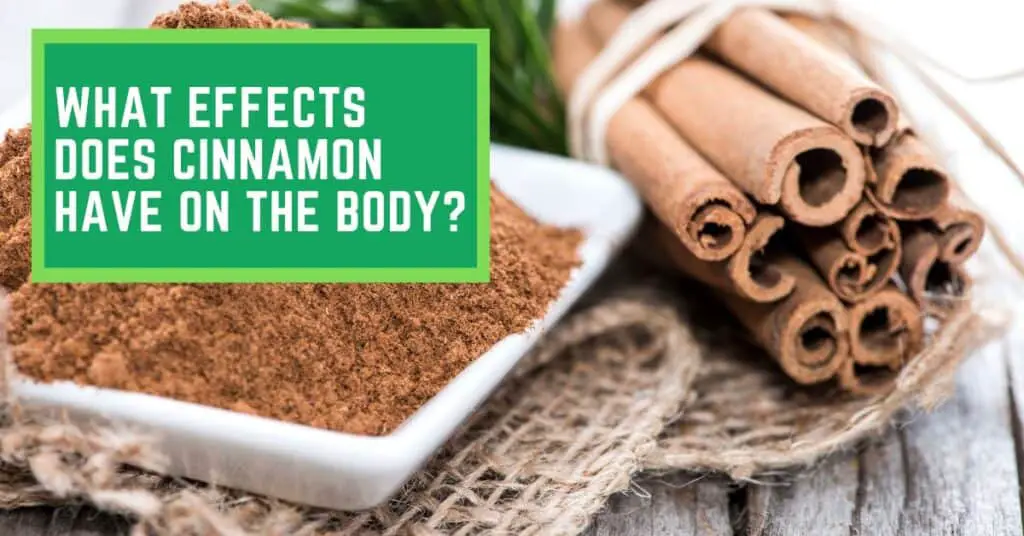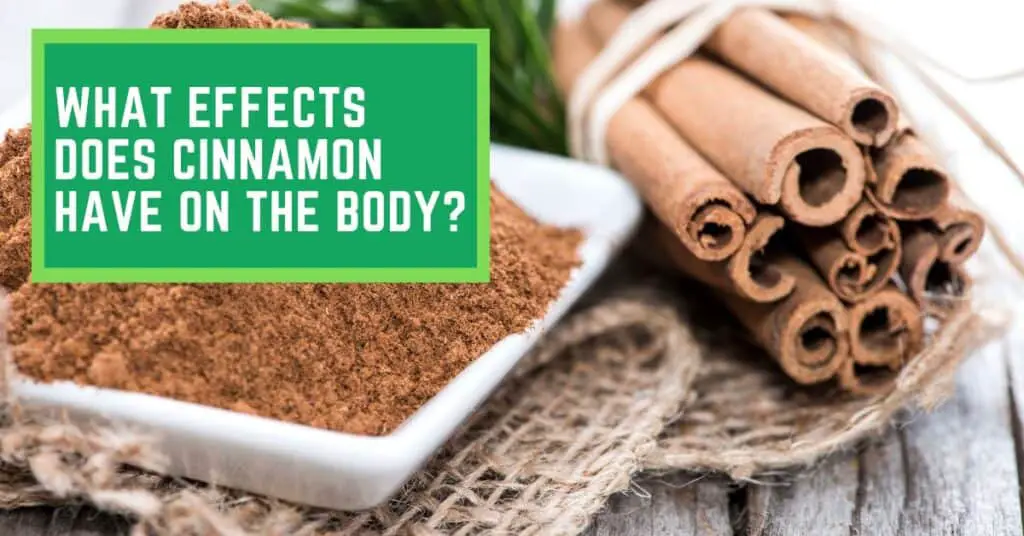Cinnamon has been used as a spice and medicine for centuries. It is thought to have many health benefits, including improving blood sugar control in people with diabetes, reducing inflammation, and fighting bacteria.
Cinnamon supplements are available in many forms, including capsules, powders, and teas. Some people also use cinnamon oil for aromatherapy.
Many people consider adding cinnamon to their diet as it is a natural and safe way to add flavour to food. It is also low in calories and has no sugar.
However, just like cinnamon is beneficial to our health, there could be possible negative effects as well. Read this article to find out more about cinnamon and what are the ways that cinnamon affects the human body.
What is Cinnamon?
Cinnamon is a spice made from the inner bark of trees that belong to the genus Cinnamomum.
There are over 250 different species of Cinnamomum, but only a few dozen are used to make cinnamon.
The most common variety of cinnamon is called Cassia cinnamon. It’s made from the bark of Cinnamomum cassia, a tree that grows in Southeast Asia.
Other varieties of cinnamon include Ceylon cinnamon (Cinnamomum zeylanicum) and Saigon cinnamon (Cinnamomum loureirii).
Cinnamon is sold as either a whole spice or as ground powder. It has a warm, sweet flavour and aroma that’s enjoyed in both sweet and savoury dishes.
How to Consume Cinnamon in Moderation?
Cinnamon is a well-known spice that has many health benefits. It can help regulate blood sugar levels, reduce inflammation, and boost brain function.
However, cinnamon can also be toxic in large amounts. Therefore, it is important to consume cinnamon in moderation.
Some experts recommend taking 1/2 to 1 teaspoon of powder per day to consume cinnamon in moderation.
There are a few ways to moderate your consumption of cinnamon. You can add it to your food in small amounts, take cinnamon supplements, or drink cinnamon tea.
You should also be sure to purchase Ceylon cinnamon, as this type is less likely to cause adverse effects. By following these tips, you can safely enjoy the many benefits of cinnamon.
Top Positive Effects of Cinnamon:
There are many positive effects of consuming cinnamon, and it has been proved by many cinnamon lovers. Here are some of the best positive effects of this spice:
Lower Risk of Type-2 Diabetes:
Cinnamon has been shown to lower blood sugar levels and improve insulin sensitivity. One study showed that just half a teaspoon of cinnamon per day lowered blood sugar levels by 18%.
Cinnamon is also rich in antioxidants, which help protect cells from damage. It’s a good idea to add cinnamon to your diet if you’re at risk for type-2 diabetes or if you have diabetes.
It May Helps Manage Blood Pressure:
There is still some controversy as to whether or not cinnamon can actually help manage blood pressure. Many people swear by its efficacy.
There are a few different ways that cinnamon is thought to help lower blood pressure.
First, cinnamon is known to be a potent antioxidant. Antioxidants work by scavenging harmful toxins and free radicals from the body, which can help protect against various diseases ( including hypertension).
Additionally, cinnamon has been shown to improve circulation and reduce inflammation throughout the body – both of which can also contribute to lower blood pressure levels.
Antifungal, Antiviral, and Antibacterial:
Cinnamon is an effective anti-fungal, anti-viral, and anti-bacterial agent. Cinnamon has been shown to be effective against a variety of fungi, including Candida albicans, Aspergillus niger, and Fusarium spp.
Cinnamon is also effective against a number of viruses, including influenza A virus, adenovirus type 5, and herpes simplex virus type 1.
Finally, cinnamon has been shown to be effective against a variety of bacteria, including Escherichia coli O157:H7 and Staphylococcus aureus.
Therefore, cinnamon can be used as an effective natural treatment for a variety of infections.
Beneficial For The Aging Brain:
Cinnamon is beneficial for the aging brain. Cinnamon has many cognitive benefits, including improved memory and alertness.
It can also help prevent dementia and Alzheimer’s disease. Cinnamon is a spice that has been used for centuries in traditional medicine to treat various health conditions.
It May Support Gut Health:
Cinnamon has been shown to support gut health in a few ways. First, it has anti-inflammatory and antioxidant properties that help to protect the gut from damage.
Second, it helps to regulate blood sugar levels, which can be beneficial for gut health since high blood sugar can lead to inflammation and other problems in the gut.
Third, cinnamon may also help to promote healthy bacteria growth in the gut. All of these effects combined make cinnamon a potentially beneficial addition to a gut-healthy diet.
VISUAL EXPLANATIONS:
Top Negative Effects of Cinnamon:
There is no doubt that cinnamon is full of positive effects. However, there could be a chance of some adverse effects if not consumed in moderation. Here are some of the top negative effects of cinnamon:
It May Cause Liver Damage:
High consumption of cinnamon can damage the liver. The main component of cinnamon that is toxic to the liver is coumarin.
Coumarin is a naturally occurring substance found in many plants, including cinnamon. When consumed in high doses, coumarin can cause liver damage.
It May Cause Mouth Sores:
Cinnamon is a spice that can be quite drying and irritate the delicate tissues inside your mouth. When these tissues become irritated, they can develop sores.
So if you’re using a lot of cinnamon in your cooking or baking, be sure to stay well-hydrated and take breaks often to give your mouth a rest.
And if you find that you’re getting mouth sores after eating or drinking something with cinnamon in it, try cutting back on the amount of cinnamon you’re using.
Interact with Certain Medications:
It is always best to speak with a medical professional before consuming large quantities of any spice, as interactions may occur. However, in general, cinnamon is safe to consume in reasonable quantities.
Cinnamon is known to interact with a number of medications, including Warfarin, Clopidogrel and Insulin.
If you are taking any of these medications, it is important to speak with your doctor before increasing your intake of cinnamon.
Additionally, individuals with diabetes should monitor their blood sugar levels carefully if they consume large amounts of cinnamon, as it may affect blood sugar control.
It May Cause Allergies:
Too much cinnamon can cause allergies. Cinnamon is a common allergen, and people can have serious reactions to it, including anaphylaxis.
Symptoms of a cinnamon allergy include itching, swelling, and difficulty breathing. If you think you may be allergic to cinnamon, talk to your doctor.
Increasing Body Heat:
High consumption of cinnamon can increase body heat. Cassia cinnamon, in particular, contains a compound called cinnamaldehyde that can help to raise body temperature.
For this reason, cinnamon is often used as a home remedy for colds and flu.
However, it’s important to note that too much cinnamon can cause side effects like nausea and dizziness. So be sure to consult with your doctor before adding cinnamon to your diet.
VISUAL EXPLANATIONS:
Who Should Not Consume Cinnamon?
Cinnamon is an incredibly popular spice, with many people using it to add flavour to everything from coffee to desserts.
However, cinnamon can also be dangerous if consumed in large quantities. Here are a few groups of people who should avoid consuming cinnamon:
Pregnant Women: Cinnamon contains a compound called cinnamaldehyde, which can stimulate contractions and cause miscarriage. Pregnant women should therefore avoid consuming large amounts of cinnamon.
People with Blood Clotting Disorders: Cinnamon can increase the risk of bleeding and bruising in people with blood clotting disorders such as hemophilia. If you have a blood clotting disorder, it’s best to avoid consuming cinnamon.
People with Liver Disease: Cinnamon can be hard on the liver, so people with liver disease should avoid consuming large amounts of cinnamon.
People with diabetes: Cinnamon can lower blood sugar levels, so people with diabetes should be careful when consuming cinnamon. You may need to adjust your insulin levels if you consume cinnamon on a regular basis.
Frequently Asked Questions Related to The Effects of Cinnamon
1. How is cinnamon made?
Cinnamon is made by drying the inner bark of the cinnamon tree. The tree is chopped down, and the inner bark is removed. The bark is then dried in the sun or in a kiln. After it’s dried, it’s ground into a powder.
2. What are the types of cinnamon?
Ceylon cinnamon and cassia cinnamon are the two main types of cinnamon.
Ceylon cinnamon is a light brown colour and has a mild, sweet flavour. It’s also the more expensive of the two types of cinnamon.
Cassia cinnamon is darker in colour and has a stronger, more bitter flavour. It’s also less expensive than Ceylon cinnamon.
3. How to consume cinnamon?
You can consume cinnamon by adding it to your food or drinks. It’s a versatile spice that can be added to sweet or savoury dishes.
You can also sprinkle it on top of oatmeal, cereal, coffee, or smoothies for an added burst of flavour and health benefits.






